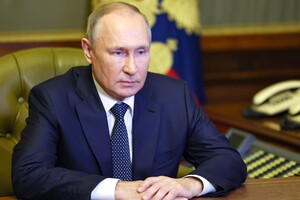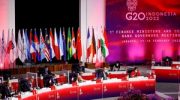Russia can continue its atrocities against Ukrainians, step up sabotage in Europe and play out time-consuming schemes.

Vladimir Putin, who lost< /strong>, resorts to increasingly poisonous schemes, forcing Western capitals to play out his murderous scenarios. He terrorizes Ukrainians in the rear cities, he is suspected of sabotaging gas pipelines to Europe and, most terrifyingly, he threatens nuclear war. All this in just a few weeks.
Western leaders are now trying to predict what he might do next. As Politico writes, they fear even more terrible versions of what has already happened: terrorist campaigns aimed at destroying Ukrainian energy facilities on the eve of winter; more destruction of the infrastructure that feeds European society; more nuclear rattle. The goal is to exhaust the patience and resources of the West in the hope of inflaming divisions in the West before defeat on the battlefield.
“Russian forces are being defeated on the battlefield,” said U.S. Army Europe Commander Ben Hodges, – Ukrainians have achieved irreversible momentum.”
Read also: The Guardian: Will Lukashenko really involve Belarus in a war in which Russia is already losing?
Officials can't be completely immune to all of Putin's tactics, debating what new weapons Ukraine might need to fight back, how to better control Europe's critical infrastructure, and how to prevent a nuclear strike.
“As allies, we must remain calm and not allow his unacceptable rhetoric to dictate our response,” Dutch Defense Minister Kaisa Ollongren said, adding that NATO is ready for any scenario.
Here's an overview of a few situations that could arise and how Western allies are preparing for them.
Terror of peaceful Ukrainians
On Monday morning, very symbolically, Russian missiles hit the center of Kyiv at peak. The missile attacks, one senior diplomat from Central Europe said, were “revenge for the bridge” connecting Crimea to Russia. But some experts fear a broader campaign is underway, as a number of other Ukrainian cities came under fire on Monday, some of which had been quiet for months, and the assault continued on Tuesday.
According to Ukrainian officials, the target is energy facilities. With the approach of winter, such communal services are vital. Analysts are worried about what might happen next. Heinrich Braus, a former assistant secretary general of NATO, is concerned that Russia's newly appointed commander of Russian forces in Ukraine, Serei Surovikin, is considered “absolutely brutal and does not care about the civilian population”.
Read also: Putin's endgame? The race for the role of the Kremlin's new leader has begun — POLITICO
On Monday, Germany announced it would speed up the delivery of advanced IRIS-T air defense systems to Kyiv, while Ukraine is to receive two American advanced national surface-to-air missile systems (NASAMS) by November. US President Joe Biden continued his promise to offer the country “advanced air defense systems”, without giving specifics.
But from a technical point of view, experts say, it is almost “impossible to protect” all of Ukraine.
Sabotage of European life
Russia is unlikely to directly challenge its NATO ally, but the Kremlin seems increasingly willing to covertly destroy the systems that underpin NATO societies. First, there were explosions on the Nord Stream underwater gas pipelines – a sabotage plot with the fingerprints of the Kremlin. Then someone cut the cables through which the German trains ran, raising the specter of yet another possible Kremlin plot. There are many other possible scenarios for the worrisome sabotage.
“We have a lot of pipelines, oil and gas, we have cables for data transmission,” said the Prime Minister of Latvia Krishjanis Karinsh. “We just need to increase our own awareness of what might be vulnerable, and then increase the protection of our potentially vulnerable infrastructure.”
Earlier this year, NATO acknowledged in an updated strategy document that such “hybrid attacks” could become so serious that they would trigger the military alliance's Article 5, which states that a military attack on one ally is an attack on all.
Read also: NYT: Putin is appeasing the most bloodthirsty people in Russia, even though he is putting himself at risk
Speaking on Tuesday, NATO Secretary General Jens Stoltenbergtold reporters that following the Nord Stream incidents, the alliance had “doubled” its presence in the Baltic and North Seas and that allies were “increasing security around key facilities”. But experts admit that Europe's infrastructure networks are so large that governments' capabilities are limited. It is possible to increase patrols both on land and at sea, but even then it is impossible to control everything. There is also the cyber threat, which adds another unwieldy dimension.
“Overall,” Brauss said, “we are all vulnerable.”
Buy time
Although Putin is raising stakes, experts say he is also trying to buy time, hoping that the cold will change the dynamics of the conflict and the West will eventually tire of arming and financing Ukraine.
“Putin moved from the question 'how do I win?' to 'how do I avoid defeat?'” said Mark Galeotti, senior research fellow at the Royal Joint Services Institute. He called the approach of the Russian leader “strategic patience”.
Experts say Putin's enlistment of several hundreds of thousands of new Russians is part of this ruse. Western leaders are well aware that Putin is banking on war fatigue and high energy prices to reduce support for Ukraine. In response, there is a feeling in Western capitals that Ukraine's allies must develop their own long-term strategy.
Also read: WP: Russia's war against Ukraine has reached a tipping point, its pace and nature are changing
Russia watchers warn that Moscow's long game may extend far beyond Ukraine. Russia has a long history of fomenting unrest abroad, with a particular emphasis on former Soviet states on the eastern edge of the EU.
“I think we should be prepared for further escalation,” said Daniel S. Hamilton, a former U.S. official who is now a senior fellow at the SAIS Foreign Policy Institute.
Threats of apocalypse
In addition, there is the prospect of nuclear war, a concept that until recently seemed unthinkable. Experts warn that nuclear weapons remain the least likely option for Moscow. Instead, the nuclear rhetoric, according to officials and experts, offers a scare tactic that should scare people both in Ukraine and in countries that support Kyiv.
Western leaders have adopted a two-pronged approach – not to let nuclear rhetoric dictate policy. regarding Ukraine and at the same time warn Moscow about the catastrophic consequences of any nuclear actions.
“If Russia can threaten nuclear weapons to secure territory it has temporarily conquered, then all of us – any of us – are being blackmailed,” said Karinš, the prime minister of Latvia. – So what's next, Putin, Russian troops are moving to Moldova and threatening a nuclear attack if someone does something? And then it could probably go on and on.”
Read also: Russia's missile strike puts pressure on allies to strengthen Ukraine's air defense – The Washington Post
The consensus is that Washington should take the initiative to persuade Putin not to break the nuclear taboo. Big countries like China and India, which help keep Russia's economy afloat, can also play a role. A nuclear attack would inevitably shake the already shaky international system and global economy, something even Russia's allies would want to avoid.
So far, U.S. officials have been deliberately vague about their response plan, indicating that Washington personally communicated his opinion to Russian officials. The US response is not expected to involve its own nuclear arsenal, but it will certainly be tough and significant.
Related video
But there are “many answers” that “would be significant”.
See special topic: Day of defenders: will tomorrow be a day off Holiday was founded in 2014. Iranian kamikazes attacked the Kyiv region: the National Police gave details Fortunately, there were no casualties. Macron: Ukraine is the borders of 1991, but negotiations are necessary He believes that this is not only in Russian interests, but also in Ukrainian interests. In Kharkiv Oblast, two road workers were blown up by landmines – head of the OVA Mine danger remains very high in the region. The Russians have prepared a plan for the “development of Mariupol” until 2035. It seems that nothing bothers them It is surprising that even supposedly liberal media do not question whether the Russian Federation will be able to maintain control over the city for so long. And it would be worth it.


